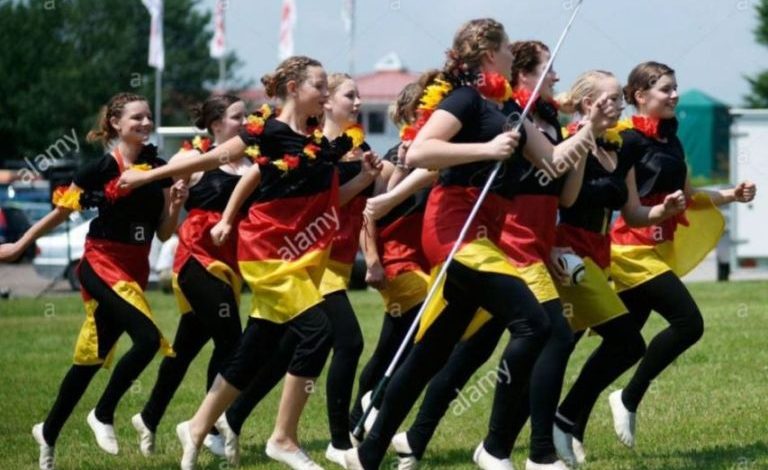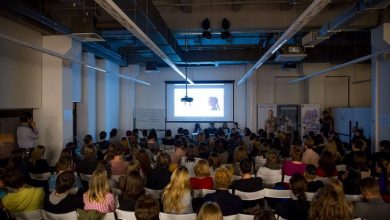Russian language is losing ground in Germany
Fewer German students are learning Russian. In the former GDR, it was mandatory, but even then not everyone knew him. Then interest in him fell every year. How to fix the situation?
As long as the GDR existed, all of its students without fail studied Russian. Behind this were the ideological motives of “German-Soviet friendship” and purely pragmatic considerations. After all, Russian was the main language of communication of the Warsaw Pact countries, and many who had international contacts proved to be really necessary.
Difficult word “attraction”
To this day, almost every older East German remembers the unpronounceable word “landmark”. True, he uses it, so to speak, not for its intended purpose, but in order to complain about how it was necessary to cram a furious Russian in childhood. However, someone has succeeded in this matter. German Chancellor Angela Merkel, who studied in Leipzig, quite well understands and even speaks Russian. But for most of the former inhabitants of the GDR, nothing but a couple of fragmentary phrases and expressions entered their memory.
The reunification of Germany dramatically changed the situation in schools. East German students were no longer offered Russian as their first foreign language. This place was taken by English. With the exception of a small number of special schools, where training was conducted in German and Russian, in all other educational institutions the Russian language was taught as a second or third. At the same time, you can choose it from a small list, which also includes, at least, French and Spanish.
The result was sobering. Russian immediately lost ground. “One of the reasons, perhaps, is that the children were obliged to teach him before,” says Anya Kretzer, project manager for the School and Youth project at the German-Russian Forum (Deutsch-russisches Forum).
Fifth place after Latin
At first, Russian was second only to English and French in the number of students. But those who went to school and started studying Russian back in the days of the GDR were already completing their studies, and new schoolchildren rarely chose the Russian language. As a result, less than 100 thousand schoolchildren are now passing it in Germany. Moreover, as a rule, not even in the quality of a second foreign language, but an optional third, with a limited number of training hours. In terms of attractiveness for young people, the Russian language takes only fifth place after English, French, Spanish and Latin.
There are several reasons for this negative development of events, according to Kretzer. Firstly, the growing popularity of other languages, such as Spanish. Secondly, the position of parents who do not know what their children will do with the learned Russian. Thirdly, the lack of political support in a number of German lands, where the study of the Russian language is not considered not only a priority, but even simply important. Prejudice also played a role.
However, most often, as an argument against the study of Russian, they call its difficulty and low demand. “Russian is a difficult language,” Kretzer admits. But the initial difficulties in the form of an unusual alphabet and complex grammar can be overcome, ”she adds. “But today everyone knows English, but few know Russian.” Meanwhile, Russia is one of Germany’s main economic partners. German companies with representative offices in Russia are happy to hire specialists who speak Russian.
Cake named after Pushkin
In Germany, many Russian books are sold. But they are bought only by “their own”
In the experience of Ani Kretzer, the decision not to choose Russian at school is most often made by parents. They are much more restrained than their children, who consider Russian an exotic and therefore interesting language. Therefore, projects that help German youth get to know Russia better are so important. Since 2006, the German-Russian Youth Exchange Fund has been operating in Germany. He helps to organize trips of German schoolchildren to Russia.
The German-Russian forum also contributes to the popularization of the Russian language. For example, the third year has been holding the competition “Learn Russian by playing,” in which everyone can participate. More than 6 thousand people became interested, and half of them had not studied Russian before. An interesting undertaking was the open creative competition “Pushkin with us.” Within its framework, it was necessary to describe their impressions of Pushkin’s works or the associations that they evoke.
The resonance was not bad, says Kretzer, and not only from writers and poets. The jury even sent a cake with the image of Pushkin. The idea of creating this unusual “art object” came to the students of one of the German schools. The jury appreciated their resourcefulness, and the cake gladly ate. The winners of the competition will be announced in Berlin on June 12. Whether there will be inventive culinary specialists among them is still unknown.
This post is also available in:
 English
English  Русский (Russian)
Русский (Russian)






